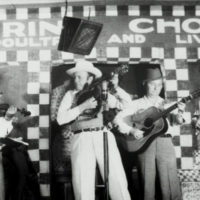
On September 16, 1946, Bill Monroe recorded for the first time with Lester Flatt and Earl Scruggs.
These two evening sessions, 75 years ago today, were the first involving the aggregation acclaimed as the ‘original bluegrass band,’ comprising Bill Monroe (lead and tenor vocals, mandolin), Lester Flatt (lead vocals, guitar), Chubby Wise (fiddle), Earl Scruggs (banjo), and Howard Watts (baritone vocals, string bass).
They took place at the CBS Studio, Radio Station WBBM, The Wrigley Building, 410 North Michigan Avenue, Chicago, Illinois, the first from 8:00 p.m. to 9:20 p.m. – during which they recorded four songs all with alternate takes – and later that evening – from 10:30 p.m. to 12:30 a.m. – they recorded four more numbers.
The producer was the Bedminster, Bristol-born Englishman, Art Satherley.
The recordings were done using just one microphone, a feature that they were used to, it being how they presented their stage shows. That said, before each take of a song was cut they rehearsed the steps that they would take to ensure that the correct volume levels – for voices and instruments – were maintained.
The first song that they recorded was Heavy Traffic Ahead (Columbia Master CCO 4605), a metaphor for a week in the life of the band at that time. In fact, it has been that way from the beginning of the year, so busy were they maintaining their personal appearance schedule.
At the beginning of the session the band “”eemed stiff, nervous, and uncertain,” according to music historian and writer Bluegrass Hall of Fame member, Charles Wolfe, and the first take suffered as a consequence. Whereas the second was “tight, crisp, punchy, and flowing.” It is this recoding that was released on a single, albeit not for almost three years.
Heavy Traffic Ahead is notable for its opening; the first recording of the famous Lester Flatt ‘G-run’ ….
An up-tempo Flatt composition Why Did You Wander? (CCO 4606) followed. It was the first Flatt–Monroe duet that the pair recorded. Neither of the two takes was perfect; with some fluffed vocals on the first, and while Monroe re-arranged the song, moving his second mandolin break to the last chorus, a minor flaw in Scruggs’ banjo break marred the second effort.
The track remained unissued until 1976 when it was released on a various artists’ collection, Hills & Home; Thirty Years of Bluegrass (New World Records NW 225).
The third song of the session was one of Monroe’s trademark numbers, Blue Moon of Kentucky (CCO 4607), recorded as a waltz.
For Dorothy Horstman’s book Sing Your Heart Out, Country Boy, New York, 1976, Monroe spoke of his nostalgic waltz tribute to his home state …
“Back in those days, it seems every trip we made was from Kentucky to Florida driving back and forth. I always thought about Kentucky, and I wanted to write a song about the moon we could always see over it. The best way to do this was to bring a girl into the song. I wanted words to this, because most of my songs were instrumentals. Kentucky Waltz had come earlier and I knew I could write both words and music, so I wrote it in the car on the way home from one of those Florida trips.”
In 1988 Blue Moon of Kentucky replaced Stephen Foster’s sentimental ballad, My Old Kentucky Home, as Kentucky’s official state song.
The session ended with Toy Heart (CCO 4608), another up-tempo duet. It features some excellent mandolin playing and is the first recording of Scruggs’ banjo work in G tuning with the low D string lowered to a C.
There were two takes of this song although, ultimately, the first was deemed appropriate.
When it was eventually released – in 78rpm and 33 1/3rpm formats – in the Spring of 1949 it became Monroe’s best-seller of the year, reaching #12 on the Billboard’s Best Selling Retail Folk Records chart.
Summertime Is Past and Gone (CCO 4609) is a ¾ tempo song arranged as a vocal trio, one of the few that the band recorded, with Watts singing the third or baritone part below Flatt’s melody. It is noteworthy also for Scruggs’ banjo solo.
Structurally, Monroe’s melody for Summertime Is Past and Gone is the simplest – an a1, a2, a, a2 sequence – of all the those for the eight songs recorded on this day. With its reference to the moon “shining bright” it closely resembles Blue Moon of Kentucky.
The fiddle solos have a bit more ornamentation and other instrumental interludes feature Scruggs’ melodically-inclined banjo – similar to that for his breaks on Heavy Traffic Ahead – in concert with Monroe’s tremolos.
Five takes were required before one was found to be a suitable master as each of the first four has a different flaw.
The second song recorded during this later session was Mansions for Me (CCO 4610), a throw-back to the relative simplicity of the duet style that Bill enjoyed with his brother Charlie. In form and melody, it is similar to their career record of a decade earlier, What Would You Give In Exchange for Your Soul?
It is the only number in the band’s record catalogue that does not include an instrumental break. Otherwise, it is notable for Wise’s discreet bluesy fiddle in the background.
Mansions for Me – paired with Mother’s Only Sleeping – was the first release from the days’ sessions. Perhaps tellingly they were only two songs for which there was just the need for one take.
Mother’s Only Sleeping (CCO 4611) was brought to Monroe by Flatt and the former has said, “He put it in both our names.”
Mother’s Just Sleeping, as it was known originally, was actually composed by Lance and Maynard Spencer some five years earlier when they were members of Charlie Monroe’s Kentucky Partners. The song was popular in the Carolinas and with slight variations it was recorded by a few acts from the region. Lester Flatt, also one of the Kentucky Partners at one time, learned the song during that stint.
This is the first ‘heart’ song – one that celebrates mother and mountains – by this combination of the Blue Grass Boys.
Blue Yodel No.4 (or California Blues) (CCO 4612) is in fact what songwriter Jimmie Rodgers called Blue Yodel Number 3, according to Wolfe.
Like Heavy Traffic Ahead it is a 12-bar blues, and during performances on the Grand Ole Opry, Monroe worked at perfecting it as a showcase for his yodeling skills. The first recording attempt was overzealous, too intricate vocally whereas the version released on a single was more conservative in approach. There are indications in the recordings that Monroe was well-aware of the traditional black ragtime mandolin style.
In the eyes of some scholars, Blue Yodel No.4 is one of the first instances in which the essential elements of the bluegrass style fell into place and coalesced on that record.
These recordings heralded a new era in country music. Lester Flatt introduced a choppier style of playing than that of earlier guitarists in the band, a solid rhythm that would help to establish bluegrass timing; Earl Scruggs a remarkable syncopated three-finger banjo that had already delighted Opry audiences; and some superb fluid fiddle work from Chubby Wise were the backdrop to Monroe’s breath-taking mandolin solos that were more jazz and blues-infused than hitherto.
Monroe expert Tom Ewing has spoken highly of the solid bass foundations that Howard Watts provided for the other band members ………
“His metronomic playing serves as a rhythmic reference for everyone in the band, freeing them from any worries whatsoever concerning the location of the beat.”
(Bluegrass Unlimited magazine, May 2002)
Vocally, Flatt’s relaxed lead and Bill Monroe’s soaring tenor set the template for the genre.
Many have written and spoken about the impact of Monroe’s recordings, broadcasts, and shows with his most famous band.
For example, British country music musician and historian, Brian Golbey, wrote in 1999 …
“Bill Monroe’s next recording date in September 1946 was without doubt the most important in the history of bluegrass music, for it was at this session that the now familiar sound was finally and definitively established. Chubby Wise was still on and [Bill] Wesbrooks had been replaced by Cedric Rainwater on bass, but it was the addition of two other members that clinched Monroe’s defining sound. On guitar was Lester Flatt who, until recently had been working with Bill’s brother Charlie as a member of The Kentucky Pardners. He was a superb vocalist and his duet work with Monroe makes him the quintessential bluegrass singer, often copied, never bettered. But it was the young 22-year-old banjo player from North Carolina who really caught the public’s imagination: Earl Scruggs had developed a style of banjo playing that had never been heard before. Using a three-finger roll he completely revolutionized the approach to the banjo. Monroe felt that he had at last found the formula he had been searching for and ‘Bluegrass’ had truly come of age.”
However, there appears to be very little in the way of a contemporary view in print. Bluegrass music historian Neil Rosenberg shared these error-strewn lines are from Billboard magazine, published a week before the recording sessions, on September 9, 1946 (p.120)…
Bill Monroe and His Blue Grass Boys are on a successful tour thru Ohio, West Virginia, and Pennsylvania. Bill’s show is composed of Cubby [sic] Wise, fiddle; Lester Flat [sic], singer and guitarist; Earl Scruggs, mandolin [sic]; and Cedric Rainwater, comedian, who also plays bass and dances. Tommy Thompson, former WSM entertainer, who has bought [sic] and been wounded in both World Wars, is now with Monroe.
… the rest came later.
Radio Station WBBM began a long association with the Columbia Broadcasting System (CBS) on September 27, 1928.
A Discography
Singles
- Mansions For Me / Mother’s Only Sleeping (Columbia 20107 and Columbia 37294, released March 24, 1947)
- Blue Yodel No.4 (Columbia 20189 and Columbia 37565, July 14, 1947)
- Blue Moon of Kentucky (Columbia 20370 and Columbia 37888, September 22, 1947)
- Summertime Is Past and Gone (Columbia 20503, October 4, 1948)
- Toy Heart (Columbia 20552, March 14, 1949)
- Heavy Traffic Ahead (Columbia 20595, July 18, 1949)
Where only one title is mentioned, the recording was paired with that from another session.
Albums
- The Great Bill Monroe (Harmony HL 7290 / HL 11335, 1961)
- The Best of Bill Monroe (Harmony HL 7315, 1964)
- Bill Monroe, Lester Flatt & Earl Scruggs The Original Bluegrass Band (Rounder Special Series 06 / CBS P 13911, 1978)
- Bill Monroe and His Blue Grass Boys: The Classic Bluegrass Recordings, Volume 1 (County CCS 104, 1980)
- Bill Monroe and His Blue Grass Boys: The Classic Bluegrass Recordings, Volume 2 (County CCS 105, 1980)
- Bill Monroe (Columbia Historic Edition FC 38904, 1984)
- The Essential Bill Monroe and His Blue Grass Boys, 1945-1949 (Columbia C2K-52478, October 20, 1992). A recording of all eight songs is included in this collection.
- The Music of Bill Monroe, From 1936 to 1994 (MCAD 4-11048, 1994)
- 16 Gems (Columbia (Legacy) CK 53908, 1996)
- Mansions For Me (Music Mill Entertainment MME 71007, November 19, 2001)
- Blue Moon of Kentucky: 1936-1949 (Bear Family Records BCD 16399 FL, 2002)
This last is the most comprehensive set as every recording, including alternate takes, can be found on this 6-CD collection.
Footnote:
William Smith ‘Bill’ Monroe, the Father of American Bluegrass Music, was born 110 years ago this past Monday, on September 13, 1911. He passed away on September 9, 1996, following a stroke.
His grave is located in Rosine Cemetery, not far from where he was born in Ohio County, Kentucky.
Monroe was inducted into the Country Music Hall of Fame in 1970, the International Bluegrass Hall of Fame in 1991, and the Rock and Roll Hall of Fame in 1997. He is the only performer to be honored by all three institutions. In 1993 he received a Grammy Lifetime Achievement Award from the National Association of Recording Arts and Sciences (NARAS). Two years later he was presented with the National Medal of the Arts by President Bill Clinton.
Tennessean Lester Raymond Flatt (June 19, 1914 – May 11, 1979) and Earl Eugene Scruggs (January 6, 1924 – March 28, 2012) both left the Blue Grass Boys in 1948 and formed their own band, the Foggy Mountain Boys, amid a 21-year career together.
The duo was elected to the Country Music Hall of Fame in 1985 and the International Bluegrass Hall of Fame in 1991. They are famously noted for their associations with sponsors Martha White Flour and the CBS TV sitcom The Beverly Hillbillies.
Robert Russell “Chubby” Wise (October 2, 1915 – January 6, 1996), from Florida, played with Bill Monroe’s Blue Grass Boys on and off between 1942 and 1948. Wise was made a member of the International Bluegrass Hall of Fame in 1998. His showpiece tune was Orange Blossom Special.
Also from Florida, Howard Staton Watts (February 19, 1913 – January 21, 1970) joined Bill Monroe in 1943 and would play bass for him off and on, for the next five years. Using the name Cedric Rainwater, he was the focus of comedy routines during that time. He was inducted into the International Bluegrass Hall of Fame in 2007.










